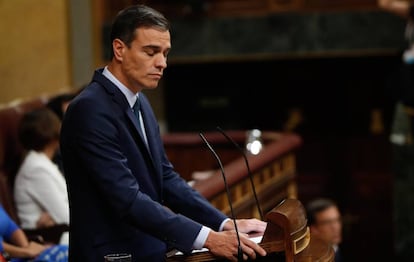Spain: starting over
Pedro Sánchez’s failure at this week’s investiture vote should not mean new elections. It means a new bid must be made at forming a government

Spain’s Congress on Thursday rejected Socialist candidate Pedro Sánchez’s bid to be confirmed once more as the head of government. The outcome had been corroborated ahead of time the day before the session, when the Socialist Party (PSOE) announced that it was breaking off talks with Unidas Podemos, claiming the latter was making unacceptable demands to form a coalition government.
The failure of Pedro Sánchez’s investiture bid does not condemn Spain to a repeat election: on the contrary, it makes it necessary to start the investiture process all over again, so that this time, the main political forces will guide negotiations down the right avenues and bring an end to the political deadlock that the country has been experiencing since at least 2015.
The countdown has begun for a new date at the ballot boxes
The result of the vote evidences that it is not possible to describe as political negotiations what amounted to mere publicity-seeking skirmishes whose goal was not so much to reach governing deals as to accuse the other side of preventing them.
To postpone the formation of an executive because of these tussles, three months after the general election, and with the next chance to do so in September in the best of cases, only brings additional expense to the numerous costs of the previous two political terms, which were defined by paralysis and instability. There are economic and social costs, no doubt, but also institutional ones: the spectacle offered by the PSOE and Unidas Podemos in the last few days is an essential ingredient in the broth where voters’ discontent with their political representatives slowly ferments.
Not even during the rare times of discretion at bilateral meetings did the talks really focus on what they should have: a governing program for the new political term. To merely underscore a generic coincidence of views on the main action lines, as Sánchez and Iglesias said on Thursday by way of justification, is not enough of a foundation to discuss the makeup of the Cabinet among potential partners.
There are economic and social costs, no doubt, but also institutional ones
Unidas Podemos took this negotiating rush to paradoxical extremes, asserting that it was not demanding Cabinet positions but policy-making powers, thereby ignoring the fact that policies must follow a governing plan that the potential coalition members never discussed in the first place. Whereas Iglesias made a brilliant first speech during this week’s investiture debate, on Thursday it was Sánchez who managed to convey his position most effectively.
From the moment that the voting ended, it was no longer up to the political parties to work against the general feeling of frustration that has spread since the waiting game began on April 28, the day of the general election. But parties are still in time to extract political conclusions from this experience. The most basic one would be to admit that in a parliamentary system, the most-voted party does not get to form a government unless it is able to assemble a majority around a policy program, and that this program lies at the core of the negotiation, whether to reach agreements or to reject them.
In the meantime, the countdown has begun for a new date at the ballot boxes. This is not a done deal and there is no need to resign ourselves to it: all it means is that there is now a fixed period of time for doing things the way they should in a parliamentary system. There are no excuses for the main parties not to start seeking that elusive majority as of today. This time, the candidate should arrive at the new round of voting with his homework done – that is to say, with a deal already negotiated.
The wounds caused by the sterile grandstanding of the last few months will pose an obstacle. But, as a counterpoint, the clarification of the political spaces that has taken place, especially during the last day of the investiture session, could be the tool to overcome this obstacle. Except for Ciudadanos, Vox and Together for Catalonia, who have deliberately shunted themselves into the sidings, all other forces – including the Popular Party – have expressed to a greater or lesser degree a desire for this legislature to honor its first and foremost constitutional duty: to invest an executive with power.
English version by Susana Urra.
Tu suscripción se está usando en otro dispositivo
¿Quieres añadir otro usuario a tu suscripción?
Si continúas leyendo en este dispositivo, no se podrá leer en el otro.
FlechaTu suscripción se está usando en otro dispositivo y solo puedes acceder a EL PAÍS desde un dispositivo a la vez.
Si quieres compartir tu cuenta, cambia tu suscripción a la modalidad Premium, así podrás añadir otro usuario. Cada uno accederá con su propia cuenta de email, lo que os permitirá personalizar vuestra experiencia en EL PAÍS.
¿Tienes una suscripción de empresa? Accede aquí para contratar más cuentas.
En el caso de no saber quién está usando tu cuenta, te recomendamos cambiar tu contraseña aquí.
Si decides continuar compartiendo tu cuenta, este mensaje se mostrará en tu dispositivo y en el de la otra persona que está usando tu cuenta de forma indefinida, afectando a tu experiencia de lectura. Puedes consultar aquí los términos y condiciones de la suscripción digital.








































